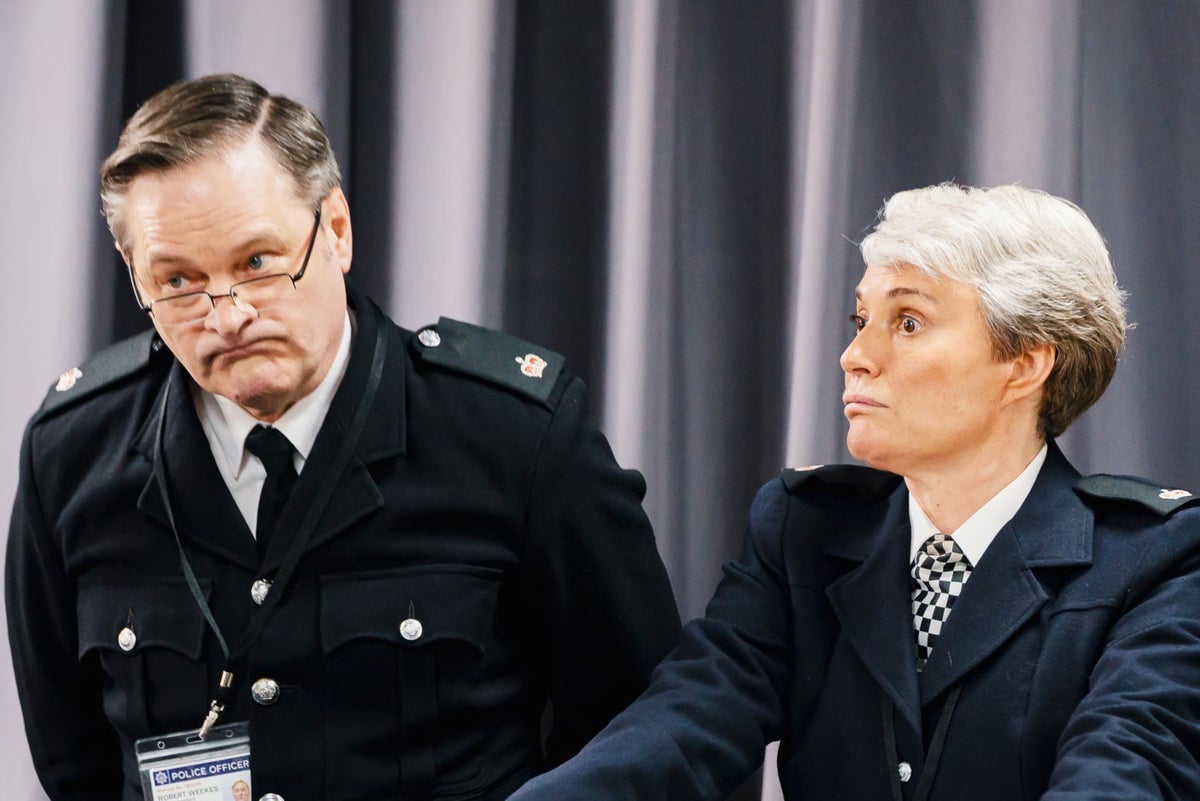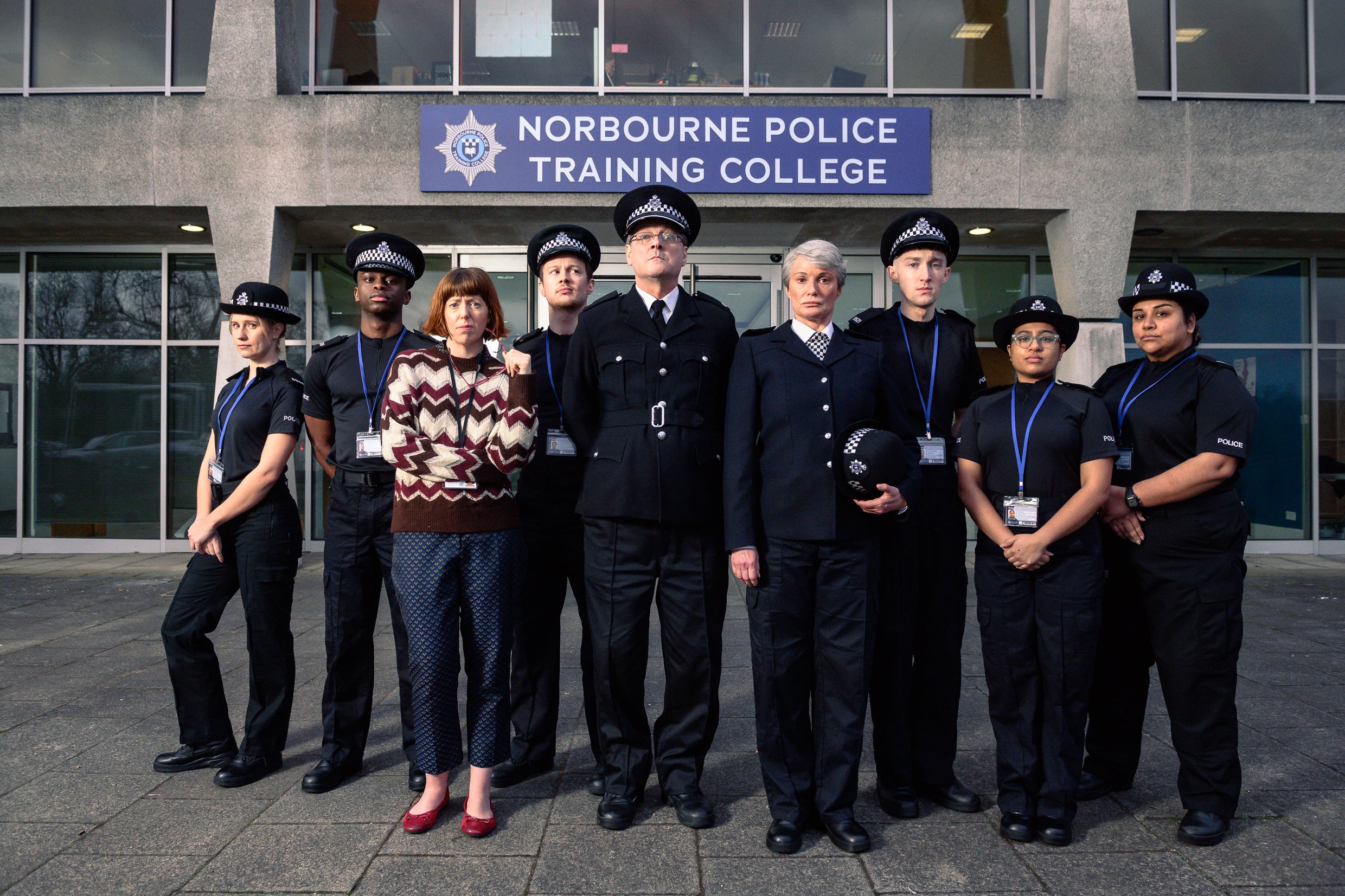
Support truly
independent journalism
Our mission is to deliver unbiased, fact-based reporting that holds power to account and exposes the truth.
Whether $5 or $50, every contribution counts.
Support us to deliver journalism without an agenda.

Louise Thomas
Editor
“Not another cop show!” might be your entirely understandable response, upon tuning into ITV’s Piglets. Flashing sirens, check-banded hats, grim-faced superiors: it all feels intensely familiar. It’s a relief then, when the facade of seriousness drops and the jokes start coming. But a shame that they’re so few and far between.
To become a police officer, apparently, you need to learn the ropes. That’s where the police training programme comes in, run by two superintendents: hapless Bob Weekes (Mark Heap) and tough nut Julie Spry (Sarah Parish). Their latest gang of recruits are a ragtag bunch of misfits and incompetents. Cocky Leggo (Sam Pote), a policing nepo baby; type-A Steph (Callie Cooke), there to try to win back her ex; naive Dev (Abdul Sessay), acquiring fodder for his aspirant career as an actor; and Paul (Jamie Bisping), the heir to a criminal dynasty, sent in as a mole.
Created by some of the writers behind the iconic Channel 4 series Green Wing, Piglets finds that show’s creator, Victoria Pile, and the team returning to familiar territory. Heap’s Weekes is, essentially, Alan Statham (Green Wing’s consultant radiologist) in a different costume; Pote’s Leggo a like-for-like switch for Oliver Chris’s smart aleck student, Boyce. The job of the authorities is, in Spry’s words, “to turn useless streaks of piss into police officers using brute force and shouting”. From that basic premise, almost every joke proceeds with a simple structure: the recruits, or their tutors, are stupid. They are too stupid to grasp the requirements of police work, but, thankfully, the stakes are low, and that results in mild confusion (calling racism “racicity” or thinking the role of “victim one” is an Italian man called “Victimone”) rather than disaster.

The model of Green Wing is ever-present in Piglets, from the fast cuts and pulpy transitions to the low-level visual absurdity (Heap salting a hard-boiled egg during a disciplinary meeting, or a recruit having to dive, headfirst, into a getaway car at the end of each workday). What’s missing, first and foremost, is a sense of reality. Part of the success of Green Wing was taking the gallows humour of the medical profession and stretching it to breaking point – not to mention lampooning perceived wastage within the NHS’s management culture. Piglets has more to say about Line of Duty than it does any issues with modern policing.
When the series was announced, the Police Federation called the show’s title “highly offensive”. They needn’t have bothered getting overexcited: the show has nothing critical, or even interesting, to say about policing. Hard-arse Superintendent Spry might have a Cressida Dick haircut, but that’s as far as the satire goes. The training process is presented as very collegiate. Indeed, when one recruit carries the can for a fellow trainee, he’s told that “covering up for your colleagues seems very cop-like to me”. But despite all the recent discourse (and a public inquiry by Dame Elish Angiolini not to mention Baroness Casey’s review) about exactly that culture of concealment, the moment is a celebratory one: a sign that the character is a good apple – and not one of the rotten ones. The show’s other problem is that it’s not funny.
Comedy is obviously highly subjective, and many sitcoms rely upon familiarity with their characters in order to establish the foundations of the joke. Rebecca Humphries’s office administrator, Melanie, for example, starts as just another harassed subordinate before evolving into the punchline of a recurring gag involving Heap’s Weekes. The better-conceived characters – dimwit Paul, forced into a life of crime in spite of his good nature, and try-hard bunny boiler Steph – have a clearer purpose in the narrative, but also suffer from a lack of yucks. If you’re going to pull your political punches, you have to land your comic ones. Instead, Piglets feels like the hasty first draft of a project, waiting for that injection of either humour or urgency.
Piglets looks like a rush job. The characters are underdeveloped, their relationships undercooked. The comedy is puerile and intermittent; too many of the jokes are missing a proper punchline. From The Thin Blue Line to Black Ops, it’s proved difficult to make an effective television comedy about the police – and Piglets does nothing to change that.
‘Piglets’ is on ITV and ITVX







